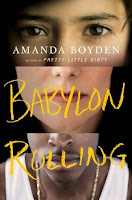 First, a confession: I read Anne Giardini’s book because I love the title so much that even before I started, I had already made up my mind that I would enjoy the novel. As Maggie, the narrator, tells us from the beginning, she’s the sober, well-adjusted middle child caught between two stormy sisters, who has never made a misstep in her entire life. For most of her thirty-two years, she’s done the right thing: got good grades, found a stable job (as a mammogram technician), had a few misguided love affairs, and lived her life responsibly. Her older sister Janet and her younger sister Lucy are the drama queens in the family and no one expects Maggie to get up to anything remotely considered wayward. That is until her sister Lucy’s ex-lover comes over from Italy to try and take her newly born nephew back with him (I’m not giving anything away; this fact is in the back cover copy!). Maggie’s actions are rash and the consequences everlasting.
First, a confession: I read Anne Giardini’s book because I love the title so much that even before I started, I had already made up my mind that I would enjoy the novel. As Maggie, the narrator, tells us from the beginning, she’s the sober, well-adjusted middle child caught between two stormy sisters, who has never made a misstep in her entire life. For most of her thirty-two years, she’s done the right thing: got good grades, found a stable job (as a mammogram technician), had a few misguided love affairs, and lived her life responsibly. Her older sister Janet and her younger sister Lucy are the drama queens in the family and no one expects Maggie to get up to anything remotely considered wayward. That is until her sister Lucy’s ex-lover comes over from Italy to try and take her newly born nephew back with him (I’m not giving anything away; this fact is in the back cover copy!). Maggie’s actions are rash and the consequences everlasting.
The Sad Truth About Happiness is by no means a perfect novel. Deeply flawed in many ways, the story feels a little far fetched, too movie-of-the-week, especially when it gets into the meaty middle section. Giardini’s writing is often messy at times, she repeats bits and pieces that have no real relevance to the story, and there’s a lot of “telling” in this book.
But, by the end I didn’t care. I didn’t care because life is messy. I didn’t care because there’s so much heart in this book that it’s impossible not to get caught up in Maggie’s life, in her insomnia, in the way that she looks at the ideals of happiness that seem to drive our modern society. I didn’t care because I was hooked from the very first paragraph. I simply couldn’t (and didn’t want) to put the book down. Particularly poignant parts of the book are found within Maggie’s relationship to and description of her aged parents, their eccentricities and obvious love for one another; of her deep understanding and explanation of how she came to her profession, the clarity and emotion from which she writes of disease, especially cancer; and of the tipping point when Maggie is spurned into action and how she copes with the aftermath.
In the P.S. section of the book, Giardini describes her sister Catherine reading some of her work and exclaiming, “put a fire into it,” and you can see the spirited way that the author has interpreted this idea throughout the book. The prose has fire to it and, to add in my own overused cliche, it certainly burns from beginning to end. In the end, I picked up the novel as I said because the title is just so striking and I am so very glad that I did. This is the perfect book for book clubs, for women to hand over to one another over lunch, for best friends to talk about late into the night.
READING CHALLENGES: Anne Giardini is Canadian (and the daughter of Carol Shields) and obviously a woman so I’m counting The Sad Truth About Happiness as the 11th book in my Canadian Book Challenge. And for those of you still looking for titles for your own challenge, it’s good to note that Giardini lives (and writes about) Vancouver. The setting is a very real and very solid backdrop for this book in particular. So, two more to go!








